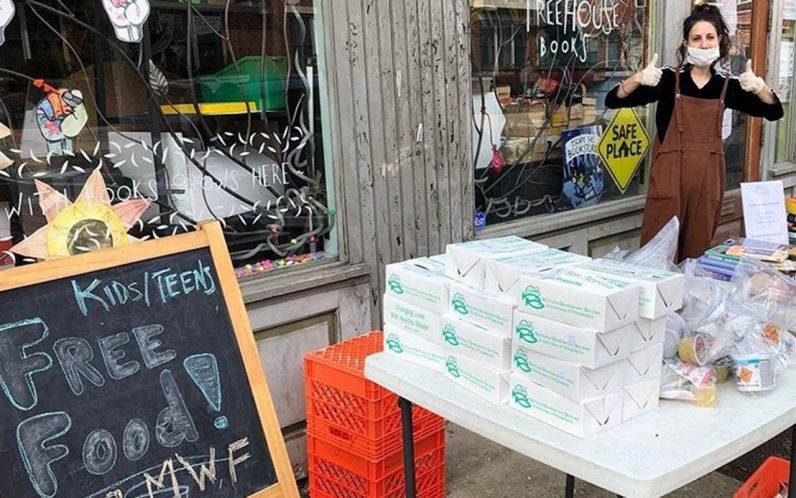
A staff member from archdiocesan Nutritional Development Services (NDS) distributes free, federally funded children’s meals outside of Treehouse Books in North Philadelphia March 31. NDS expects to deliver some 14,000 grab-and-go packages at more than 25 area sites, as the coronavirus pandemic deepens food insecurity throughout the region. (Photo courtesy of Erinn J. Hill)
Archdiocesan Nutritional Development Services (NDS) is working to feed children in the Philadelphia area who are at greater risk for hunger and malnutrition due to the coronavirus pandemic.
NDS is sponsoring more than 25 meal distribution sites located throughout the city and its suburbs.
The free grab-and-go packages, available for children and youths aged 18 and under, provide balanced nutrition that accounts for daily caloric and vitamin requirements.
[hotblock]
Funding for the meals is provided by the U.S. Department of Agriculture’s (USDA) child nutrition program, which NDS administers locally.
Over the past 10 years, NDS has served upwards of 77 million meals through all of the federally funded programs it manages.
The agency, a beneficiary of the Catholic Charities Appeal, plans to deliver 14,000 meals to the growing list of sites, much to the relief of families already hit hard by business and school closures.
“We had a school principal thank us, since her community is very low-income,” said Erinn J. Hill, NDS’s director for the USDA national school lunch program. “She said the looks on the families’ faces when they received the meals was humbling, and she wished we could be there to see it.”
The coronavirus has exacerbated Philadelphia’s ongoing food insecurity, which rose 22% from 2012 to 2017.
In the last two weeks, more than 830,000 Pennsylvanians have found themselves unemployed following a statewide shutdown of schools and non “life-sustaining” businesses – part of a public health move to limit the spread of the virus.
New unemployment claims since the shutdown have already surpassed those filed in all of 2019.
To ensure clients’ safety and adhere to pandemic-related guidelines, Hill said she and her colleagues have revamped the meal distribution process. Parents are no longer required to bring their children with them to the sites.
In addition, families can collect several days’ worth of meals in a single visit to minimize the need to leave their homes.
Breakfast packages are now “shelf stable,” said Hill, enabling sites with limited refrigeration to offer that meal as well.
The list of sites and the number of clients at each, according to Hill, is growing.
“Current sites are calling to increase their deliveries,” Hill said. “So we expect the requests for meals to continue to increase.”
***
For the most updated list of NDS feeding sites, visit the agency’s website.
PREVIOUS: Join in the Lenten virtual retreat this week
NEXT: Thousands learn to ‘cling to God’ in 1st night of virtual retreat


Share this story